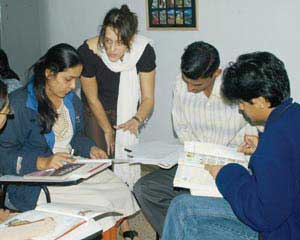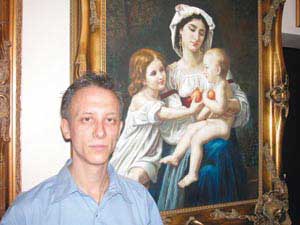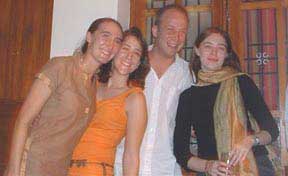India
Expats In India

Growing numbers of Europeans and Americans are moving to India for work and are falling in love with the culture, or the weather, or the food, or someone.
|
India is awash in brain drain again. Only this time, the current is flowing in reverse.
For the past five decades, India’s best and brightest were lured by the glamour of the West. Today, growing numbers of Europeans and Americans seem to be enchanted by India. Many of them are discovering heady professional opportunities in the country’s booming information technology sector. Some have fallen in love with the culture, others with the weather, yet others with the food and in some cases with someone here. McArthur Mille, language trainer from Canada, currently living in Bangalore, says, “I was interested in working here, as there was an opportunity available. I just jumped at it. What brought me here was the kind of work that I could do here.” Sheila O’Hara first came to India as a tourist while still in college. Now she works with Microsoft as a language and culture trainer. “I did not specifically ask to come here, but since India is an interesting place to work in if you are in the IT industry, I just took the plunge,” she says. “There is a technology boom taking place. Certain parts of India are developing quickly, and it is interesting to notice all these changes at such close quarters.” By far the biggest draw for recent expatriates is the information technology industry, but they are also sprinkled in the hospitality and media industries. Bangalore’s reputation as a technology hub has made it the destination of choice for recent expatriates. Presently, an estimated 10,000-12,000 foreigners live or work in Bangalore. “About 6,000 – 7,000 foreigners get their residential permits each year from our office,” says Jagadeesh Prasad, of the Foreigners Registration Office, Office of the Commissioner of Police, Bangalore. “This number has been on the increase each year, with a large number of students, professionals and businessmen coming in.”
Of the expatriates in Bangalore, some 2,500 are students pursuing professional education or internships from a wide assortment of countries, such as Iran, Bangladesh, Sri Lanka, Germany, France, etc. Prasad estimates the number of employment seekers at about 500 in 2004. “While students stay on if they find good jobs, the professionals work here and some make it their home. Some of them leave after a year or two. This makes it hard to put a finger on the exact number of expatriates living in Bangalore from a long time,” says Prasad. Nationwide, between 20,000 to 30,000 expatriates are believed to be working in India. That’s a fraction of the 100,000 foreigners working in China, and even more in Hong Kong and Singapore, the Asian destinations of choice for expatriates. However, the appeal of India continues to grow. Many foreigners working in India are on assignment with multinational companies from their headquarters, such as South Korea’s M.B. Lee, who is vice-president of marketing at Samsung India, which also has several other South Koreans in senior management positions in its India division. Likewise, Bob Hoekstra, a Dutch national, is chief executive of Philips Software. But increasingly, Indian companies are also turning to foreign leadership. The chief executive officer and managing director of Ranbaxy, Brian W. Tempest, is British and Raymond Bickson, managing director and chief executive officer of Taj Hotels, is American. But the greatest surge in expatriate workers is occurring among mid level professionals, especially in the technology sector. Last year, CNN reported that Monster.com India listed 3,000 foreigners seeking work in India. Delhi-based Technovate eSolutions, a BPO in the travel space, boasts that nearly 10 percent of its 700 employees are drawn from all over Europe. The leading Indian software companies Infosys and Wipro both employ hundreds of foreigners.
“While many foreign born professionals come to India to work, I have also seen a lot of People of Indian Origin (PIOs’) coming back in the recent past to live here. We get their proposals each year and this number is also quite substantial as they come back with their spouses and their children,” says Prasad. He is hreferring not to returning NRIs, but rather foreign born Indians or Indians who have since acquired the citizenship of another country. “When the many expatriates came in the early nineties, Bangalore was far more attractive and peaceful, and this could have influenced their decision to stay on here” says Sashi Sivramkrishna, who recently produced a documentary on the “Expatriates in Bangalore.” While most expatriates in Bangalore draw salaries equivalent to their Indian counterparts in the profession, some, especially in the BPO segment, command higher compensation due to their international exposure and language proficiency. Banaglore’s expatriate community has a wide cross section of people, from CEOs of multinational corporations to recent graduates. Some of them can afford very affluent lifestyles, comparable to or even better than that in their home countries. Others lead relatively Indian middle class lives or even struggle. “While many expatriates get drawn towards the local culture, and mingle with the locals, at the same time, a few remain aloof and as a ‘gated community’ hardly mingle with Indians,” says Sivramkrishna.
“The expatriates are spread all over Bangalore, except for the older areas, such as Gandhinagar, Malleswaram etc. and many live in the central Bangalore areas. One may find them in Richmond Town, M.G. Road and surrounding areas,” adds Sivramkrishna. Petra Klerkx, a senior graphics designer from Holland, says “The life here is fast and busy. There is much happening on the streets, so much of unpredictability. In Holland, what you expect, you get, which is not true here. Here life is very different. Here people do not have a sense of time. I would say time does not exist. ‘Kal’ in Hindi means yesterday and also tomorrow, so you see it doesn’t make sense (laughs).” For the past four years, Klerkx has lived in Bangalore for nine months, spending the remaining three months every year in Holland. For some expatriates, like Dr. Jean Letschert Ascharyacharya, artist, philosopher and writer, the journey to India has been deeply spiritual. With a Ph.D. in Sanskrit and an understanding of Indian culture that is so deep as to even embarrass the locals, Ascharyacharya is not a typical westerner. He has lived in India for almost 40 years now, painting and undertaking social work among the under privileged and villagers. Ascharyacharya first came to India way in the 1970s. “I often feel I am a crowd, that there are many people inside me. Generally speaking, I am an artist and close friends tell me I am a renaissance artist. I am a philosopher and have a Ph.D. in Sanskrit and as a person have always tried to have a large spectrum of interests. I have been trying to find the links that interconnect the various bodies of knowledge and this has been my life search.”
Undoubtedly that cultural pull is strong among the expatriates settled in India. “I call this home and my country home too, and keep in touch with people there. I would like to be a person who calls two places home and vacillate between two places and positions. I also write and would prefer to write in Dutch. I am writing poetry and working on a novel,” says Martiene Meijer, a Dutch national, who is involved with the Jung Centre. Nenad Zuza, a Serbian national who came to Bangalore five years ago, has also lived in Mysore. The 32-year-old, who fought in the Serbian war and has seen life and death at close quarters, is in Bangalore promoting European art. “Many things brought me to India. I am spiritually inclined, so that brought me here. The ancient Vedic texts and particularly the Gita brought me here. I had many friends here and in time I thought of moving here. One of my friends started the gallery (Masters International), and he wanted help. So I am here helping him,” he says. Anne Julie has lived in Bangalore for a year now and has an equivalent of masters in French language. She teaches French at the Indian Institute of Science (IISc). “I wanted to experience something different from the European and American culture, so I chose India as a destination for work and in fact India is a fashionable place to go to,” she says. Half her friends have been to India and Indian movies and clothes are a rage in France. “I think there is a change taking place in India both in the cultural as well as the social context and I want to witness it first hand; that is another reason why I am here,” she says. Growing opportunities “Working with the Indians has been a rewarding experience,” says Eric Rousseau, director of Alliance Francaise, Bangalore. “The sense of family is very much present here even in the workplace.” “In France, the individual is supreme even in the work place, but it is totally different here; as the organization comes first,” says Julie, who teaches French at Alliance Francaise. Manoj Padmanabhan, Bangalore branch manager of Naukri.com, India’s premier job portal, says that many of the foreigners who apply for jobs on their website do so through relatives or friends. “We have received about 70 resumes in the last six months for placements in Bangalore,” he says. While most applications are for the IT sectors, there are also enquiries for posts of trainers, translators etc. With 1,500 tech companies, Bangalore is clearly the leader in attracting foreigners. The opportunities for foreigners to find work in India, and Bangalore in particular, are growing. There is a need for foreign language trainers and also executives. Salaries are often competitive with those in their home countries and the experience of having worked in India is increasingly looked at favorably on resumes, says a head-hunter. “The job applicants from overseas are looking out for salaries which are comparable to what they would earn in their home country,” says Padmanabhan. The added incentive of working in India is the international exposure they get. “With multi-national corporations re-locating their operations to India, most of the expatriates want to experience greater diversity and challenges at work, hence want to come here.” Bangalore ranks highly among the expatriate community. Several expatriates interviewed expressed a marked preference for Bangalore, mainly because of the large expatriate community here and also because of its weather, which does not get extremely hot or cold. Other cities of choice include Pune, New Delhi, Hyderabad and Mumbai. The foreigners feel that metropolitan cities like Bangalore and Mumbai are more hospitable to them. “The day I came here, I felt at home with the large expatriate community ready to help me out with anything I wanted,” says Ivan Moura, a Swiss national pursuing his post-doctoral work at the Indian Institute of Science. “I did feel a bit intimidated by the looks of people on the streets of Malleswaram and other traditional areas where my white skin drew a lot of attention. Other than that, there has been no real culture shock.”
Most expatriates enjoy the unhurried pace of work here. “There are many things which are not in control here, like power, or time. If I get caught in a traffic jam, I am invariably late for my appointment. People seem to accept this,” says Moura. “There is no hurry to finish things and move on as in Europe.” “I have had a long holiday in Bangalore from the time I have come” says Moura. “The people here are good, and the work happens at its own pace. There is no sense of hurrying as in Europe or USA, and I feel very comfortable here.” He says he would love to stay on if he finds a suitable job. “There is no reason why I will not make Bangalore my home. The weather is great, the people are friendly and added to this, I feel very good living here. If I am able to find a partner, I would love to settle down here.” McArthur says, “We work with a work force which is 95 percent Indian and there are certain Indian attitudes at work. The people here are more than qualified to do what they are doing. I think the people here have accepted us well, as we bring with us an awareness and specific moors of the culture. It is better for them than reading a book or browsing the net to know about American accent or culture.” The hassles The bureaucratic hassles are the biggest gripe among expatriates. “I had to struggle for five days at the Foreigners Registration office to get my permit,” says an expatriate who asked not be identified. “It makes us feel we are not welcome here.” There are also the occasional cultural conflicts. Julie Hughes, who teaches French at Alliance Francaise says, “It gets quite difficult at times. For example, when I am having a party at 11 in the night and my landlord comes and makes a big hue and cry about it. It is frustrating that they do not understand. Otherwise, living and working with Indians is quite easy.” she says O’Hara’s biggest criticism is noise. “When you are at home, trying to do something by yourself, there is so much noise. I have also found it difficult to handle the cultural differences, for example – a lot of Indians do not communicate clearly. They are not able to say no, when all they want to say is no.” Sussane Letzel, a German student pursuing an internship with St. Johns Medical Hospital, in Bangalore says she is most saddened by the inequalities prevalent in India. “The work here in the medical field is very different, as not every patient is treated equally. Those with the power to buy medical care can, others are let do die. This is what saddens me most.” The public apathy toward the poor was toughest on Rousseau as well. “I see people dying on the street and others not caring a damn about it. This is the greatest shock for me,” he says. Long time expatriate residents, such as Ascharyacharya, rue the increasing Westernization of India, especially the traffic and flyovers, which are increasingly dominating the city. “Bangalore is no India, and is becoming a monster in a sense. The mythological monster in all the fairytales – it is the idea of the freak, which has gone astray from a natural project. Something like Frankenstein. “Bangalore is trying to be an international megalopolis. A place, which was recently called the Garden city, a calm place, is now being showcased as something else. There is a shift in paradigm, which is the opposite of the possible identity, which could have been. It is rushing towards low culture and superficiality. There is greater intelligentsia in Kerala. Bengal, Bombay, Delhi, Calcutta have an intellectual aura about them. Bangalore could have had that, but the city has lost the opportunity.” The great Indian experience Nevertheless most expatriates say they are enjoying life in India. Letzel gushes about her Indian experience, “I may stay back if I get a job. My stay is for four months after which I plan to visit Germany for a brief period and then decide about my future.” “It was my first time in India and I have thoroughly enjoyed my stay here. Bangalore is not India at all. It could pass off as any city of Europe for the diversity that it has. Yesterday I called my mother and told her that there is no reason for me to come back to Germany, and she was quite surprised, but she would let me be.” Rousseau says, “It is fashionable to visit India among the people of France. We are aware of the socio-economic changes taking place here and this brought me to Bangalore to see them first hand.” He adds, “One thing that I notice about the expatriate population in Bangalore is that all of them are happy to be here. The people of Bangalore are open and do not mind if we ask too many questions.” He estimates the population of French expatriates in Bangalore at over 300. Klerkx says, “Since I have been in Bangalore for a long time, people treat me as one of them. They are accommodating. Once the first barrier is broken; then things fall into place. My skin color doesn’t really matter to people now.” O’ Hara says, “The acceptance by people is slow but also warm.” Indeed, “I find England weirder each time I go home.” The Indian experience is also transforming for many expatriates. McArthur says India has forced him to become assertive as a person as it is necessary for life in the country. “I feel it is making me a hard person, so I worry that when I go back, people may feel I have become a cold person.” “I do not consider myself very nationalistic when I lived in Canada, but I realized how much we base our identity on where you come from. I do miss my family and friends back home,” McArthur says. So would they recommend India to friends back home. “Definitely not!” retorts Meijer. “I wouldn’t want to part with my discovery. They must discover the treasure that India is for themselves.” Alas, her little secret is increasingly dribbling out. |






